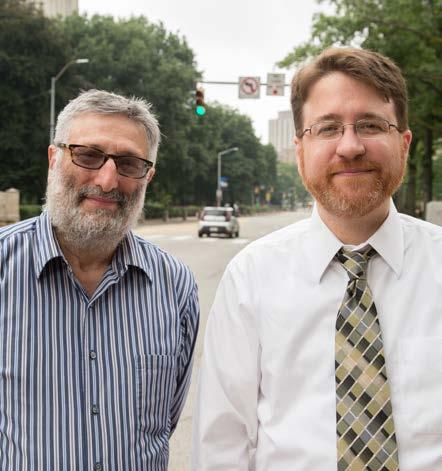
5 minute read
Centers


Advertisement
James Huguley
Center on Race and Social Problems (CRSP)
The University of Pittsburgh’s Center on Race and Social Problems (CRSP) conducts and disseminates rigorous applied social science research on race, ethnicity, and color and their influence on the quality of life in the United States. CRSP’s areas of research focus include: economics, education, health, mental health, law, older adults, race relations, and youth and families. CRSP also facilitates mentoring for scholars who focus on race-related research through efforts like pilot study funding, race research groups, and opportunities for feedback on writing efforts.
CRSP’s core faculty are highly accomplished in both procuring research funding and in producing publications for academic and public audiences. Currently CRSP faculty are overseeing more than $10 million in external research funding. In addition, their pilot grant program has invested over $200,000 in University of Pittsburgh race scholars since 2014, which in turn has generated more than $6 million dollars in external grants for awardees. CRSP faculty continually publishes prolifically in high profile journals across the fields of education, health, psychiatry, psychology, social work, and sociology.
Research dissemination efforts include the Center’s own peer reviewed academic journal, Race and Social Problems, which is among the most highly rated interdisciplinary race research journals in the applied social sciences. The CRSP Speaker Series also has attracted more than 5,000 visitors in the past year, and the lecture archives feature more than one hundred talks from race research leaders across the country. Moreover, CRSP Area Reports on specific topics like educational or health inequities have been influential to local and national policy-makers. Overall, over its 18-year history CRSP has become a national resource for race-related social science information for both academic and public audiences.


David Brent and Shaun Eack
Directors of CiTECH
Initiated in 2018, CiTECH is a unique collaboration between the University of Pittsburgh School of Social Work and the Department of Psychiatry. The goal is to study, understand and improve community behavioral health services and the Center is directed by Shaun M. Eack, PhD and David A. Brent, MD. The mission is to enhance the quality and length of life of individuals living with behavioral health conditions through community interventions.
Since its founding, CiTECH has made significant progress in developing research projects, funding pilot awards to support new interventions, mentoring junior faculty and trainees across both departments. Community engagement and community based research are fundamental to its success.
Research productivity has been substantial including receipt of $7 million in new extramural funding from sources such as the National Institutes of Mental Health (NIMH), the Simons Foundation, Autism Speaks, and the Health Resources and Services Administration (HRSA). Over 30 peer-reviewed articles have been published in the last year.
CiTECH awarded four new practice innovation awards funding unique community-engaged projects such as:
• Partnering with African American churches to increase clergy and congregations’ mental health awareness, knowledge, and skills;
• Expanding caseworker knowledge about Intensive Family Coaching;
• Expanding therapist knowledge about the Central Regional Office of the
Allegheny County Office of Children, Youth, and Families (CYF);
• Adapting and piloting an evidence-based team training intervention for
Child Advocacy Center multi-disciplinary teams;
• Building collective efficacy among youth and adult residents in several
Pittsburgh neighborhoods in order to prevent violence and lessen the impact of exposure to violence on mental health.

CWERP collaborates on multiple research and evaluation projects across the state of Pennsylvania. Current statewide efforts are focused on the annual evaluation of their Title IV-E education programs, as well as evaluation of their newly revised Foundations of Pennsylvania Child Welfare Practice training for new caseworkers and Foundations of Supervision training for new supervisors. In addition, CWERP will serve as the evaluator for the upcoming implementation of the Family First Prevention Services Act (FFPSA) in Pennsylvania.
Clinical Associate Professor and CWERP Principal Investigator, Helen Cahalane, was awarded a five-year workforce excellence grant through the National Child Welfare Workforce Institute (NCWWI) and the U.S. Children’s Bureau of the federal Administration for Children and Families. This award is in collaboration with the Allegheny County Department of Human Services. Within the School of Social Work, the project established the Child Welfare Workforce Excellence Fellows (CWWEF) program that is designed to prepare MSW students to enter practice in public child welfare. Targeted organizational interventions and workforce improvement initiatives within the Allegheny County Office of Children, Youth and Families are also components of the grant. CWWEF Project Coordinator, Edoukou Aka-Ezoua, is currently working on a project to better understand the impact of a statewide child welfare intervention on the child welfare outcomes of adolescent girls of color.
Research Assistant Professor Marlo Perry has recently taken on the role of Director of Research and Evaluation for CWERP. In this role, Dr. Perry oversees all research and evaluation projects across the CWERP continuum (Child Welfare Resource Center and Title IV-E programs), as well as facilitates opportunities for crossover between research faculty and staff in both locations (Oakland and Mechanicsburg). After a brief hiatus due to the COVID-19 pandemic, Dr. Perry is finishing up data collection for her grant funded through the Steven Manners Faculty Development Award focused on emotional variability in child welfare caseworkers and how it relates to professional quality of life and commitment to the field. Additionally, Drs. Perry and Cahalane are leading a collaborative effort with Wesley Family Services and Allegheny County Office of Children, Youth, and Families. Funded through the Center for Interventions to Enhance Community Health (CiTECH), this collaboration is focused on increasing the accessibility of Intensive Family Coaching (IFC), which is a home-based adaptation of the evidence-based practice, Parent Child Interaction Therapy (PCIT), to children and families involved with the child welfare system.
In addition, members of CWERP work with child-serving organizations across the state to help them with program evaluation efforts. Upcoming research for CWERP may include exploring access to technology of older youth in care and how that relates to the quantity and quality of their social supports, using content analyses of application materials to determine career trajectories of participants in our IV-E education programs, and incorporating evidence-based practices to improve self-care and wellbeing of child welfare professionals.

Helen Cahalane
Principal Investigator, Child Welfare Education and Research Programs






